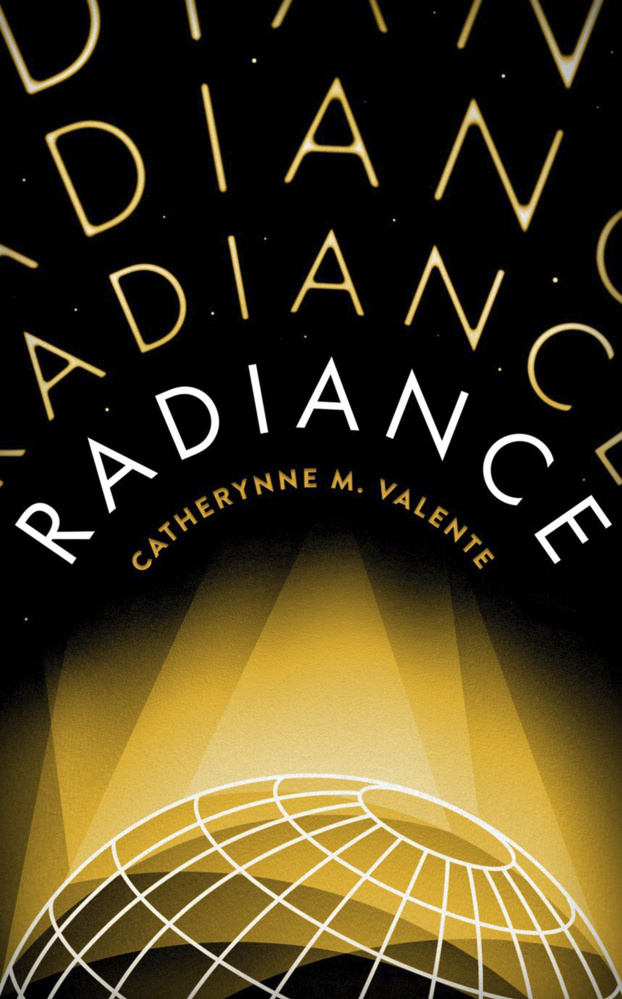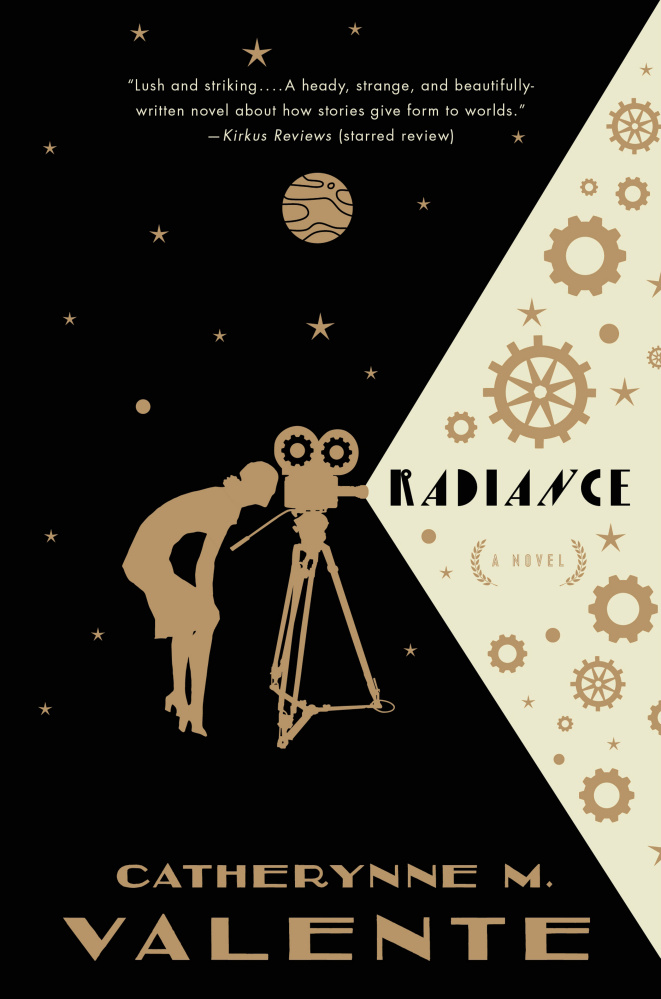Peaks Island science fiction and fantasy writer Catherynne M. Valente, author of “Deathless” and “Palimpsest,” has a taste for the ornate. The title alone of the first volume in her best-selling young-adult series, “The Girl Who Circumnavigated Fairyland in a Ship of Her Own Making,” bears witness to her love of language and her appreciation for the heightened reality of myth and fairy tales.
Now Valente gives her inclination toward the baroque full rein in “Radiance,” her first novel for adults in more than four years. Valente has described the novel as a “decopunk-pulp-science-fiction-alt-history-space-opera mystery.” Indeed, it’s difficult to compose a summary any more concise than that.
“Radiance” chronicles the celebrated career and mysterious disappearance of documentarian Severin Unk, daughter of pioneering Golden Age film director Percival Unk, who, as another character puts it, “Made a heap of sweaty gothic dramas full of wraith-like heroines with black, bruised eyes and mouths hanging open in horror or orgiastic transcendence or both.” Even as she selected a series of women for her father to marry and to temporarily replace the biological mother who abandoned her, Severin ended up rejecting practically everything offered by Percival, most especially his old-fashioned cinematic aesthetic.
“Radiance” is set in an alternate world different from ours in a host of mind-bending ways. Thanks to the tight grip on the relevant patents by Thomas Edison’s heirs, sound films are a rarity and silent black-and-white features have remained popular for decades. Travel by rocketship within the solar system is quick and easy, and each planet proves habitable, as they are in the classics of Golden Age sci-fi. To survive their cosmic perambulations, space travelers rely on delicious and healthful callowmilk, harvested from gigantic, whale-like alien creatures, “the only source for the all-important bone density supplement and radioactivity prophylactic without which humanity would still be bound to one lonely planet.”
A winner of the James Tiptree Jr. Award and a nominee for the World Fantasy Award, Valente doesn’t waste much time holding the hands of her readers. Instead, she hip-checks them into the deep end of the narrative pool, allowing them to sink or swim amid a welter of unfamiliar character names and references to mythology and popular culture. The non-linear story is told via a variety of primary and secondary sources: film scripts, items from the gossip rags, interrogation transcripts, personal diaries, ship manifests. The connections between those documents prove elusive for much of the book, but “Radiance” gradually gathers momentum as the cross-references intersect and the themes coalesce.
Severin’s story proves deeply linked to the callowhales and their miraculous fluids. While making what would be her final film, “The Radiant Car Thy Sparrows Drew” on the watery planet Venus, Severin, her film crew and her cinematographer/lover, Erasmo St. John, visit Adonis, a town devastated by some impenetrable disaster. The only survivor is Anchises, a traumatized boy with something strange and disturbing growing in the palm of his hand. When she bends down to minister to him, Severin winks out of existence.
“Radiance” details the many attempts to make sense of Severin’s sudden absence. Following the filmmaker’s funeral in absentia, Limelight magazine editor Halfrid H. writes, “We suppose she is dead, though none of us can be sure. She is not here, though she is not there, either, so far as anyone can tell. What transpired that awful autumn on those far Venusian shores? What happened to her? Did she share the horrid fate of the ruined village, the very one she sought to uncover and explain? We cannot know. We know only that we will see her no more, and that, my loyal readers, must break every heart in two.”
At certain points in “Radiance,” some readers may find themselves as mystified as Halfrid, overwhelmed by Valente’s dense, allusive prose and her oblique approach to world-building. But those who persevere and pay attention to the details will find themselves amply rewarded.
“Radiance” is not a book built on easy exposition. Rich with ideas and incident, it celebrates the magic of storytelling in a truly unique fashion and illuminates the struggles of family, ambition and art in a fresh new light.
Berkeley writer Michael Berry is a Portsmouth, New Hampshire, native who has contributed to Salon, the San Francisco Chronicle, New Hampshire Magazine, the Los Angeles Review of Books and many other publications. He can be contacted at:
mikeberry@mindspring.com
Twitter: mlberry
Send questions/comments to the editors.





Comments are no longer available on this story